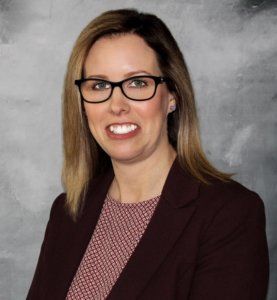This blog was last updated on September 25, 2020
Sovos’ Global Compliance Summit – Intelligent Reporting “Speaker Spotlight” Series kicks off with the introduction to two brilliant women in the world of tax, Kelli Wooten of KPMG LLP and Susie Jensen of Zions Bancorporation, who will be attending & presenting at our upcoming conference in early October. These two professionals are particularly well-versed in tax information reporting for global financial institutions and multinational corporations.
In this first segment of the Speaker Spotlight Series, we hear from these tax experts as they elaborate on the complexities of reporting in our current 2020 landscape and offer some best practices for ensuring compliant filing to both the IRS & the States.
Welcome, Kelli & Susie!
 Kelli Wooten – KPMG
Kelli Wooten – KPMG
KELLI WOOTEN is a Managing Director in KPMG LLP’s Information Reporting and Withholding practice. Kelli advises both foreign and domestic clients on the Foreign Account Tax Compliance Act (FATCA) and the Common Reporting Standard (CRS) as well as assisting clients in the implementation of procedures for compliance with these regimes. Kelli also counsels both financial institutions and multinational corporations on matters involving domestic and non-resident alien withholding and reporting issues. Prior to joining KPMG, Kelli was the Global Commercial Lead – Tax Services for CTI Tax Solutions of IHS Markit.
Kelli is a past member of the IRS Information Reporting Program Advisory Committee (IRPAC) where she chaired the International Reporting and Withholding (IRW) subgroup as well as a previous Vice Chair of the IRS Electronic Tax Administration Advisory Committee (ETAAC).
Sovos: You are very knowledgeable in all things Corporate Tax – specifically in the realm of 1042-S. Can you tell us a bit more about what we might expect to learn from your GCS Intelligent Reporting sessions, this year?
Kelli: I’m really excited about how we have changed up the Form 1042 and 1042-S session this year! I love all the questions that the session usually generates, but it does make it really challenging to get through all the material in one 50 minute session. So rather than an overview session and a special topics session, it is going to be one extended session this year.
In terms of content, I look forward to speaking about a new tool the IRS is preparing to launch which will allow organizations to essentially “validate” their Form 1042-S reporting in advance of filing. There has been some extensive testing activity taking place and this could be a game-changer in terms of Form 1042-S reporting – it will definitely make you want to pay a lot of attention to the “common errors” portion of my session!
Sovos: What is the most common concern you are hearing related to this upcoming tax information reporting season?
Kelli: Navigating tax reporting in a virtual world. There is understandably a lot of concern about it being the initial year for Form 1099-NEC reporting – particularly given we are in the middle of a global pandemic that is requiring many individuals to work from home. The tax reporting process requires so much coordination between different groups that it will be a challenge to move that to our new virtual world. We’re also so used to working with this information day in & day out that it can be easy to forget that reporting is all about personally identifiable information – names, taxpayer identification numbers (TINs), addresses, etc. Finally, running various reports & reporting applications can use a significant amount of internet bandwidth which may already be tapped out with virtual school, spouses also working from home, etc. Organizations need to be spending the time now to think about how they will navigate these issues. January is too late to be surfacing these concerns and trying to solve them.
Sovos: What is one best practice you would advise for those responsible for reporting on 10-series forms this tax season?
Kelli: TIN Matching! It’s a free service from the IRS and the companies that use that tool have seen marked reduction in their B-Notice (CP2100) volumes. I appreciate that the registration process is cumbersome – as you do have to provide your adjusted gross income from your personal tax return; however, this information is only shared between the user and the IRS (which already has the information) – no one else at the company sees it. This year, it’s our understanding that COVID-19 promises to be particularly challenging for clients and payees to respond to B-Notices, particularly those second B-Notices which require either a Letter 147C or social security card to remediate. This is similar to what we saw in late 2018/early 2019 with the federal government shutdown when payees were unable to obtain these documents or faced significant wait times to obtain them. TIN matching and being able to resolve any mismatches prior to reporting saves significant time & money. Now is a great time to do a bulk TIN match, as it gives organizations an opportunity to follow up on any mismatches to ensure you are able to file with correct information.
Don’t forget the states – while the Combined Federal State Filing Program (CFSFP) is a useful tool, it is not a complete solution. A number of states are decoupling from federal requirements, particularly with respect to Form 1099-K reporting and other states are leaving the program altogether. In addition, with this being the initial year for Form 1099-NEC reporting, the processes are not in place for this reporting to be processed through the CFSFP so any state filing requirements will need to be completed directly with the states. Also, states are becoming more and more active in their enforcement activities.
 Susie Jensen – Zions Bancorporation
Susie Jensen – Zions Bancorporation
Susie Jensen is a Vice President and Tax Compliance Manager at Zions Bancorporation, one of the nation’s premier financial services companies (with total assets exceeding $70 billion). Susie presents a rare perspective to Sovos’ GCS Intelligent Reporting Summit, sitting as a member of Sovos’ Client Advisory Board (CAB). The CAB works closely with Sovos’ executive leadership & subject matter experts to advise upon our product and service offerings.
Susie has been working in information reporting for about 18 years. This responsibility became a specialty of hers purely due to the massive changes made to the W-8 forms when the IRS altered their one page W-8 format to the new layout that included 4 separate forms (W-8BEN, ECI, EXP and IMY). Later that same year, Zions Bancorporation added the responsibility of all 1099 reporting to Susie’s team’s plate. She fell in love with all things information reporting due to the complexity and ever-changing landscape. Information reporting continues to evolve and change so there is an opportunity to learn something new every year. Susie has a strong operational background, having helped to implement Sovos’ Taxport system as the primary reporting system for information returns & withholding as well as creating a centralized tax function at Zions Bancorporation prior to moving into her current role within compliance.
Sovos: You are very well-versed in the industry of Financial Institutions throughout your time at Zions. Can you tell us a bit more about what we might expect to learn from your GCS Intelligent Reporting sessions, this year?
Susie: I would love for the attendees to be able to collaborate and share best practices for managing the reporting of 10-Series forms within & across their organizations.
Sovos: What is the most common concern you are hearing related to this upcoming tax information reporting season?
Susie: The changes to the 1099-MISC and the new 1099-NEC forms. Ensuring these changes are implemented in time for 2020 reporting will be pertinent to a successful 2020 tax reporting season.
Sovos: What is one best practice you would advise for those responsible for reporting on 10-series forms this tax season?
Susie: Complete an annual testing of your organization’s reporting prior to January. This will give you the time & opportunity to see what issues might be there and correct them before forms are produced in January. It also helps to ensure the anticipated timeline for processing and mailing files will work smoothly for your team and to determine where there may be pockets of extra time available to address any last minute issues so print/mail deadlines are not missed. For reference, our testing at Zions starts in October and runs through the middle of December which has helped us with our January timelines immensely.
Sovos would like to thank Kelli Wooten & Susie Jensen for taking the time to collaborate with us and offer just a handful of their extensive knowledge prior to speaking to the collective group at the conference. We are so excited to welcome them both to GCS Intelligent Reporting – 2020!
To learn more from Kelli, Susie, & many other industry stalwarts, register for Sovos’ GCS Intelligent Reporting Conference that will be held virtually from October 5-9, 2020. Earn up to 17 CPE credits, network with other tax professionals, and learn everything you need to know about 1099 and unclaimed property reporting for tax year 2020.
*LAST DAY TO REGISTER IS THIS FRIDAY, SEPTEMBER 25th, 2020! Reserve your spot today!*